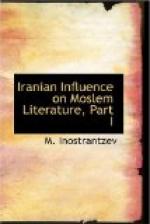according to their own inclinations and to violate
law, as if the oppressed were in dejection and made
way for the tyrant; as if greediness on all sides had
opened its jaws and swallowed all that was far and
near; as if there was no trace left of contentment;
as if the wicked had exalted themselves to Heaven
and had made the good sink into the ground; as if nobility
of mind were thrown from the loftiest pinnacle to
most abysmal depths, as if turpitude were in honour
and authority and as if sovereignty had been transferred
from the exalted to the mean—in fact as
if the world in the fullness of its joy were crying,
“I have concealed the good and brought the evil
to light.” When, however, I reflected on
the world and its condition and on the fact that man,
although he is the noblest and foremost of creatures
in it, is still in spite of his eminent position,
subject to one misery after another and that this is
his notorious peculiarity so that whoever has even
a tittle of reason must be convinced that a human
being is unable to help himself and to exert for his
salvation,—this greatly astonished me, as
further consideration told me that he is debarred
from salvation only because of the small miserable
enjoyments of smell, taste, sight, hearing and feeling
of which he may receive a fraction or enjoy a particle
but which is insignificant being so transient.
He is, however, so much taken up with it that on its
account he does not trouble himself for the salvation
of his soul.
Then I looked for a similitude for this behaviour
of human beings and found the following:
A certain person was fleeing from a danger into a
well and suspended himself by clinging to two branches
which grew on its edge, his feet striking against
something which supported them. When he looked
round there were four serpents which were projecting
their heads from their holes. As he looked into
the bottom of the well he noticed a dragon with its
jaws open expecting him to fall his prey. And
as he turned his head up to the branches he observed
at their roots a black and a white mouse which were
ceaselessly gnawing at both. While he was contemplating
the situation and casting about for a means of escape
he descried near him a hollow with bees that had made
some honey. This he tasted and he was so much
absorbed in its deliciousness that he no more thought
of the condition he was in and that he must devise
some contrivance of escape. He became oblivious
of the fact that his feet rested against four serpents
and that he did not know which would attack him first,
forgot that the two mice were without cessation nibbling
at the boughs by which he was hanging, and that as
soon as they had gnawed them through he would drop
into the jaws of the dragon. And so in his heedlessness
he yielded to the enjoyment of the meed till he perished.




